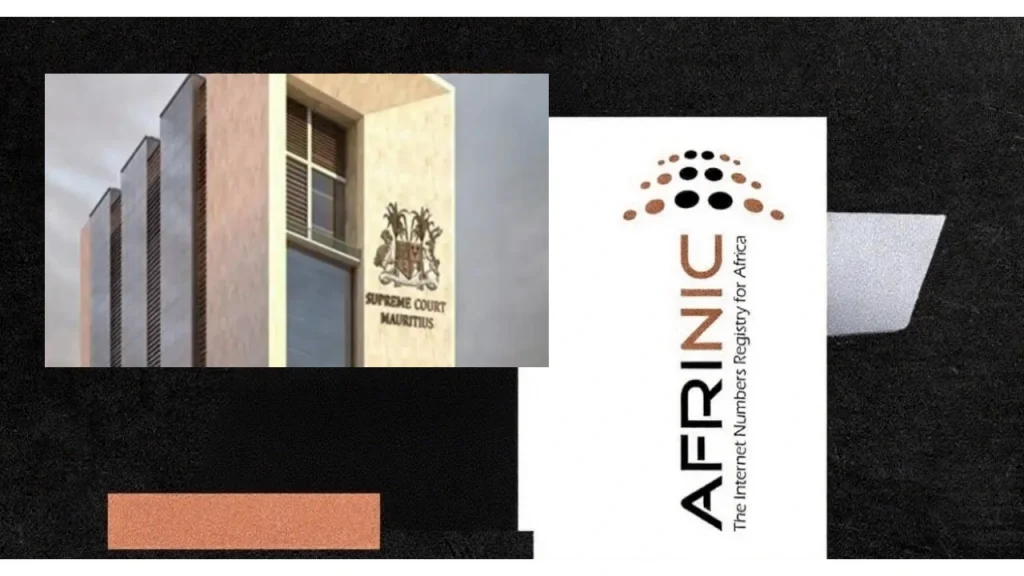- AFRINIC is covered extensively by Mauritius’ top newspaper as “declared company” status and other events gain attention.
- AFRINIC faces legal turmoil with Cloud Innovation; government steps in to restore oversight and legitimacy.
L’Express, the most widely-read newspaper in Mauritious, in its August 20, 2025 edition, highlighted the spiraling governance crisis at AFRINIC—Africa’s regional Internet registry—driven by extended litigation with Cloud Innovation Ltd over IP address allocations. Cloud Innovation, once a significant member, initiated legal action that led to AFRINIC’s receivership and winding-up push. The board’s improper constitution further compounded governance breakdown, prompting election oversight by a court-appointed receiver.
In response, the Mauritian government elevated AFRINIC to “declared company” status—an exceptional step under the Companies Act, granting authority to halt all court actions and launch a state-backed inspection. Judge Nicholas Ohsan-Bellepeau was appointed inspector, empowered by constitutional and legal provisions. His credentials—judicial experience and impartiality—were seen as foundational for restoring credibility amid allegations of misuse of court mechanisms and procedural opacity.
This intervention arrives against the backdrop of escalating global concern: AFRINIC’s dysfunction threatens Africa’s control over its digital infrastructure, risking external intervention via ICANN. The upcoming inspector’s report was viewed as pivotal in evaluating AFRINIC’s structural failings and charting a path forward for transparent governance.
Since then the judge has seen his mandate revoked by the President, as critics pointed out that no sitting Judge should be appointed by the executive to tasks away from court. This has amounted to overreach by the government and a potential cha;;enge to the Constitutional law of the country.
Also read: 5 people destroying AFRINIC and turning Mauritius into an anarchy
Also read: Constitutional tensions in Mauritius as AFRINIC flounders
Governance turmoil at AFRINIC: A detailed breakdown from L’Express
Legal quagmire with Cloud Innovation Ltd
AFRINIC, the African Internet registry, has been entangled in persistent legal battles instigated by Cloud Innovation Ltd—a once-prominent member expelled following disputes over IP address allocations. These tensions escalated as Cloud Innovation pursued receivership and ultimately pushed for AFRINIC’s compulsory wind-up.
Receivership & questionable board composition
As litigation mounted, AFRINIC was placed under receivership. The original Board was not properly constituted, prompting the appointment of a receiver whose mandate included restoring legitimate governance through properly organized elections.
Government intervention via ‘declared company’ status
In a dramatic turn, the Government of Mauritius designated AFRINIC a “declared company” under Section 230 of the Companies Act—an extraordinary measure enabling state oversight for the public interest. This action suspends existing legal actions against the organization, freezes new ones, and triggers a government-appointed investigation.
The inspector appointment: A Supreme Court judge
Under the Companies Act, any appointed inspector must be a qualified auditor with five years’ experience or a sitting or former judicial officer. Given the complexity of the case and potential misuse of legal process, the President selected Judge Nicholas Ohsan-Bellepeau, a sitting Supreme Court judge, as the inspector. He was temporarily relieved of judicial duties until 30 September 2025 to carry out this mandate.
Context & consequences: What this means for AFRINIC
Mounting institutional pressure
The protracted legal warfare with Cloud Innovation has crippled AFRINIC’s governance, leading to a boardless and CEO-less structure and raising doubts about its legitimacy.
Choosing a Judge as investigator
Judge Ohsan-Bellepeau brought decades of judicial credibility and neutrality—qualities deemed vital given the crisis. His selection, invoking Section 77(3) of the Constitution and Section 7(3) of the Courts Act, fueled discourse on the balance of institutional powers.
What’s next?
A report by Judge Ohsan-Bellepeau was highly anticipated to shed light on procedural failures, the legality of receivership, and Cloud Innovation’s demands. Its findings had the potential to shape AFRINIC’s future, influence ICANN’s stance, and define regional Internet governance norms.

